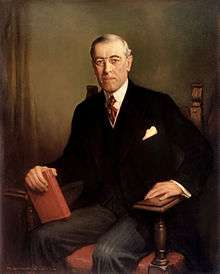Wilsonianism
Wilsonianism or Wilsonian are words used to describe a certain type of ideological perspectives on foreign policy. The term comes from the ideology of United States President Woodrow Wilson and his famous Fourteen Points that he believed would help create world peace if implemented.
Common principles that are often associated with "Wilsonianism" include:
- Advocacy of the spread of democracy[1]
- Advocacy of the spread of capitalism[2]
- Opposition to isolationism and non-interventionism[3]
- Pro-imperialism,[4] in favor of intervention[5][6]
Figures
- Presidents Bill Clinton, George W. Bush, and Barack Obama have been repeatedly referenced as continuing the progressive tradition of Wilsonianism in America.[7][8] This is primarily due to their continuing efforts of nation building and interventionism.
Notable instances
- Bill Clinton's nation building in The Balkans around the time of the Bosnian War.[9]
- George Bush's nation building and interventionism in Iraq and Afghanistan during the war on terrorism.[10]
- Barack Obama's intervention in the 2011 Libyan civil war.[11]
- Former U.S. Secretary of State Henry Kissinger once described the making of American foreign policy as an ongoing conflict between Wilsonians and Jacksonites.
Criticism
Critics of the concept of "Wilsonian idealism" say that Wilson only wanted ethnic self-determination and democracy in European countries which were under the control of rivals of America. Elsewhere such principles were ignored. Modern critics such as paleoconservatives argue the principles are overly idealistic and can lead to unnecessary military interventions, putting lives at risk over abstract concepts rather than direct threats.
Some have also criticized naming the advocacy of interventionism after Woodrow Wilson, noting that Wilson himself was not a war hawk and only declared war following commissions' overwhelming support of doing so.
Alternative uses
The legacy of President Wilson in domestic interventionism is sometimes also referred to as Wilsonianism.
In the United Kingdom, the term "Wilsonian" or, rarely, "Wilsonism," is sometimes used to refer to the ideas associated with former Labour Prime Minister Harold Wilson, usually relating to his time in office from 1964-70 rather than his troubled return from 1974-76. It usually suggests the idea of "classless" technocratic social democracy, which inspired much of excitement in Great Britain around the time of his landslide victory in the 1966 general election and is often related to his famous comment about "the white heat of technological revolution."
See also
- Human rights
- Idealism
- International relations theory
- Liberal internationalism
- New world order (politics)
- Open Door Policy
- Political realism
- United Nations
Further reading
- Ambrosius, Lloyd E. Wilsonianism: Woodrow Wilson and His Legacy in American Foreign Relations (2002) excerpt and text search
- Babík, Milan, “George D. Herron and the Eschatological Foundations of Woodrow Wilson’s Foreign Policy, 1917–1919,” Diplomatic History 35 (Nov. 2011), 837–57.
- Ikenberry, G. John, et al. The Crisis of American Foreign Policy: Wilsonianism in the Twenty-first Century (2008) excerpt and text search
- Kendall, Eric M., “Diverging Wilsonianisms: Liberal Internationalism, the Peace Movement, and the Ambiguous Legacy of Woodrow Wilson” (PhD dissertation, Case Western Reserve University, 2012).
- Layne, Christopher. The Peace of Illusions: American Grand Strategy from 1940 to the Present (Cornell Studies in Security Affairs), Cornell University Press, 2006.
References
- ↑ "Woodrow Wilson and foreign policy". NEH.gov. Retrieved 2011-12-10.
- ↑ "Woodrow Wilson, Impact and Legacy". Miller Center. Retrieved 2012-08-30.
- ↑ "Woodrow Wilson". Spartacus Education. Retrieved 2011-12-10.
- ↑ Steigerwald, David. Wilsonian idealism in America Page 31. Cornell University Press. Retrieved 2011-12-10.
- ↑ Steigerwald, David. Wilsonian idealism in America Page 58. Cornell University Press. Retrieved 2011-12-10.
- ↑ "PBS Presidential Biography". Public Broadcasting System. Retrieved 2011-12-10.
- ↑ Cole, Kevin. "The Wilsonian Model of foreign policy". United States Airforce. Retrieved 2014-10-06.
- ↑ Rosenthal, Joe. "The Crisis of American foreign policy". Carnegie Council. Retrieved 2011-12-10.
- ↑ "Kosovo talks". Fair.org. Retrieved 2011-12-10.
- ↑ Roberts, Joel. "Bush's top ten flip flops". CBS news. Retrieved 2011-12-10.
- ↑ Sayani, Daniel. "Obama continues Bush foreign policy". The New American. Retrieved 2011-12-10.

